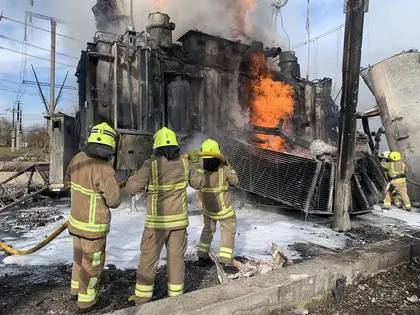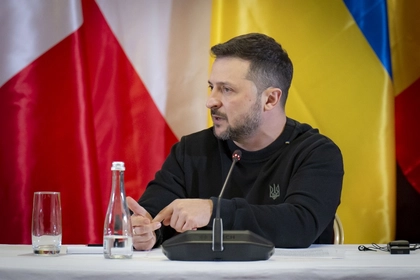Attacks on Ukraine’s vital infrastructure are “inevitable”, Russian President Vladimir Putin told German Chancellor Olaf Scholz on Friday, Dec. 2.
Repeating anti-West propaganda, the Kremlin issued a statement following a telephone conversation between the two leaders, saying: “Attention was drawn to the destructive line of Western states, including Germany, that are pumping the Kyiv regime with weapons, and are training the Ukrainian military.”
Putin claimed that the “political and financial support” from Ukraine’s allies “leads to the fact that Kyiv completely rejects the idea of any negotiations,” and warned that further missile strikes were inevitable.
“It was noted that the Russian Armed Forces had long refrained from precision missile strikes against certain targets on the territory of Ukraine.
“But now such measures have become a forced and inevitable response to Kyiv’s provocative attacks on Russia’s civilian infrastructure.”
Since late October, many parts of Ukraine have had to endure rolling blackouts to conserve energy, with President Zelensky saying on Nov. 1 that “Russian missile and drone attacks destroyed 30-40 percent” of Ukraine’s energy system.
On Oct. 10, Russia launched its first major attack on Ukraine’s energy facilities, hitting critical infrastructure in key Ukrainian territories such as Kharkiv, Zaporizhzhia, Lviv, and the nation’s capital, Kyiv.
Subsequent missile strikes have further damaged Ukraine’s energy system, while the attacks have also claimed the lives of numerous innocent civilians.

Accidental Ukrainians: The Russian Invasion Through American Eyes
On Oct. 17, two residents of Kyiv, Bohdan and his heavily pregnant wife Viktoriia, were killed when a Russian drone hit their home on Zhylianska Street, Kyiv.
Most recently, on Nov. 23, multiple fatalities were recorded in the capital following another missile attack, with Kyiv Mayor Vitali Klitschko confirming on Telegram that a 17-year-old girl was among the dead and that running water had been disconnected across the city.
In response to the Kremlin’s statement regarding Putin and Scholz’s telephone conversation, Berlin spokesman Steffen Hebestreit told the press:
“The chancellor urged the Russian president to come as quickly as possible to a diplomatic solution, including the withdrawal of Russian troops.”
Hebestreit said that during the one-hour phone call, Scholz “condemned in particular the Russian airstrikes against civilian infrastructure in Ukraine and stressed Germany’s determination to support Ukraine in ensuring the defense capability against Russian aggression.”
Ukraine has been supplied, particularly by the U.S., with air defense systems to protect its infrastructure from future attacks. However, on Dec. 1, Ukrainian military official Mykola Danyliuk announced to reporters that evidence reveals that Russia is now using dummy nuclear-capable missiles to “exhaust the air defense system of our country.”
He said that even though tests on missile fragments found in two western regions of Ukraine did not show abnormal levels of radioactivity, they were confirmed to originate from Soviet-made X-55 cruise missiles, designed for nuclear use.
While it was revealed that Russia had removed the nuclear warheads from the missiles, Danyliuk stressed that even such a missile replaced with a non-explosive warhead “poses a significant danger” due to its kinetic energy and fuel residues.
Meanwhile, many Kyiv residents continue to experience long periods of darkness, with blackouts in some cases lasting over eight hours a day, with the winter weather in Ukraine plummeting to below freezing.
At the Kyiv Security Forum today, the mayor warned Kyiv residents to be prepared for various scenarios and urged citizens to “Stock up on water, non-perishable food and warm clothes. Also, anyone with friends or relatives who live in rural areas away from the city should talk with them and be prepared to move out there if necessary, should conditions worsen.”
You can also highlight the text and press Ctrl + Enter






